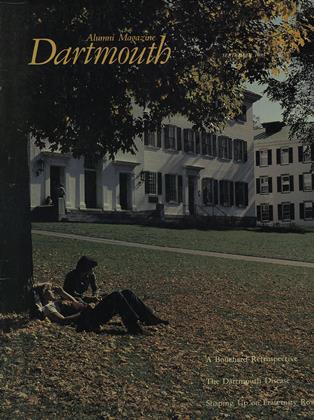A record total of $9,372,000 was raised in the annual Dartmouth College Alumni Fund campaign which concluded June 30th. Altogether, 26,634 alumni, parents, and friends contributed, with 67 percent alumni participation the best alumni participation of any college or university in the nation.
Results of the 69th Alumni Fund campaign were announced by Robert D. Brace '52, chairman of the Alumni Fund Committee and president of Investors Bank & Trust in Boston. The total represented a $350,000 increase over last year and an alumni participation increase of one percent.
Highlighting the 1983 Fund achievements was a $1,542,000 gift presented by the Class of 1958 for its 25th reunion, the largest total ever contributed by any Dartmouth class in a single year or campaign. The Class of 1933 celebrated its 50th reunion with a record 50-year gift of $661,000, while 1923, for its 60th reunion, contributed a record $124,000, and the sth reunion class of 1978 also set a record with contributions totaling $54,830.
Included in the Alumni Fund totals were nearly half a million dollars in contributions from Dartmouth parents and $1,071,000 in corporate matching gifts from companies which match contributions by alumni employees.
In terms of participation, one class the Class of 1926 had 100% of its membership contributing to the 1983 Fund. Close behind were the Classes of 1923 and 1935, which each had 98% participation. The class achieving the largest number of total donors was 1982 with 815 contributors in its first campaign.
The executive director of the Alumni Fund, Henry Eberhardt '61, cited the dedicated efforts of some 3,700 men and women who worked as class agents on the campaign. "We are especially gratified by the increase in alumni participation for the seventh consecutive year," Eberhardt said.
Fraternity traditions here at Dartmouth are directing the minds of the brothers away from the curriculum and to making little more than passing grades. They work against and to some extent nullify the primary purpose of the College. The social traditions of fraternities compete strenuously and usually successfully with the curriculum and drain off interest and energy which under this tradition would be utlized in the scholastic, intellectual and less distracting social pursuits which go truly to enrich the life of the undergraduate. Senior Report 1924
 View Full Issue
View Full Issue
More From This Issue
-
 Feature
Feature"Ladieees and Gentlemen.
September 1983 By Jim Tonkovich '68 -
 Feature
FeatureShaping Up
September 1983 By Shelby Grantham -
 Cover Story
Cover StoryThe Dartmouth Disease
September 1983 By George O'Connell -
 Feature
FeatureA VETERAN MOVES ON
September 1983 By Brad Hills '65 -
 Feature
Feature"Those Who Miss The Joy, Miss All"
September 1983 By Nardi Reeder Campion -
 Feature
FeatureAdrian Bouchard's Dartmouth
September 1983 By D.C.G.
Article
-
 Article
ArticleANNOUNCEMENT OF PLANS FOR INAUGURATION OF PRESIDENT NICHOLS
June, 1909 -
 Article
ArticleMANY GROUPS STUDY MUSIC
February 1920 -
 Article
Article'58 Joins the Family
October 1954 -
 Article
ArticleSullivan, Dryfoos New Trustees
February 1951 -
 Article
ArticleAlumni Award: Adrian “Whip” Walser ’32
NOVEMBER 1992 -
 Article
ArticleA Monster of a Class
Nov/Dec 2002

